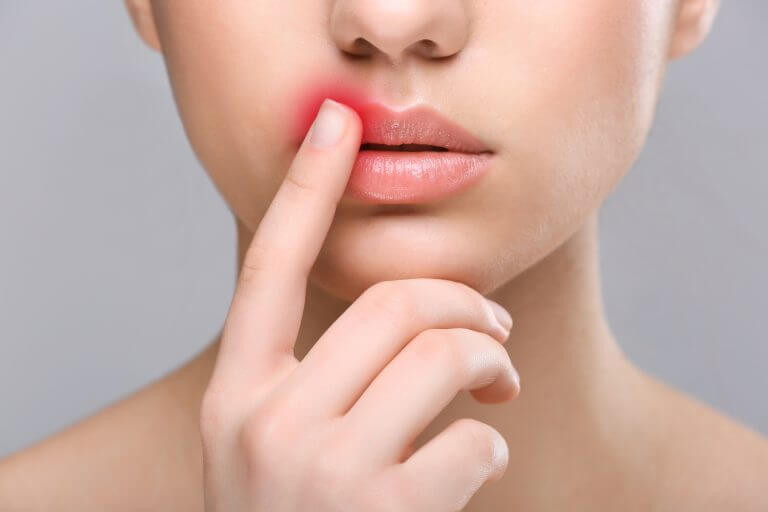What are Cold Sores?
You might be one of many people who gets “cold sores”. This is a troubling issue for those experiencing it and can carry a negative stigma. However, this is a very common viral infection caused by herpes simplex virus (HSV).
HSV likes to gain access to the body near mucous membranes (e.g., around the mouth or in the genital or anal area) because these areas are more permeable than other areas of skin on the body.
How Do You Get Them?
It is typically acquired by close contact with another person with an active infection (or active “cold sore”). When HSV is acquired around the mouth, such contact often occurs by kissing or oral sex. When HSV is acquired in the genital region, also known as genital herpes, it is acquired by sexual contact.
“BUT, I DON’T THINK THAT I’VE EVER BEEN IN CONTACT WITH SOMEONE WITH A COLD SORE.”
Unfortunately, HSV can linger until a sore has completely crusted over and healed. So, you might not be able to tell that someone has recently recovered from a cold sore, but they might have the slightest activity at the site of the sore still present, which could be concealed in some way.
HSV has an interesting way of infecting and reappearing. Upon exposure, HSV gains access through the skin and travels along nerves toward an area in the nervous system which lies near the branching point of the affected nerve from the spinal cord.
HSV is then able to lie dormant for months to years before reappearing. When a triggering event occurs, HSV can then reappear, travel back down its original route, and back out to the skin as a cold sore. So, you could have been infected with HSV many years ago but only notice your first bad cold sore now.
Common Triggering Events Include:
- Infection
- Ultraviolet light exposure
- Stress
- People that become immunosuppressed are especially prone to develop increased frequency of HSV infection. For example: initiation of systemic steroids or other immunosuppressant medication or acquisition of an illness that harms the immune system, such as human immunodeficiency virus (HIV).
One can generally tell when a cold sore is looming, with a tingling or burning sensation occurring before the cold sore appears. This typically occurs around the lips but can occur anywhere in close proximity to the mouth, including the chin and near the nose. It can also occur near the genital or anal region or on the lower back in the case of genital herpes.
Once the cold sore begins to develop, the patient may initially notice a painful red bump. This bump may then start to show several grouped small blisters, known as vesicles. This is a hallmark feature of HSV infection. Within several days, these small blisters burst, creating a clear or yellow discharge that dries, forming a crust or scab. This typically occurs one week after the cold sore is first noticed and can take 2-3 weeks to completely heal.
At any point while this cycle is playing out, the affected area is able to give off infectious HSV, which can infect anyone else that comes in contact with the infected area. So, don’t go kissing on your sweetie, kids, or grandkids during this time!
Treatment
HSV infections are very easy to control. Fortunately, most people’s immune systems are able to prevent HSV infections from occurring very often. However, if you are frequently exposed to the above triggering factors and start to experience increasing frequency of HSV infections, visit your friendly neighborhood dermatologist.
You can be prescribed an effective oral antiviral medication that will help to resolve a current infection more quickly and prevent future infections. Depending on the frequency of your infections, you may be able to use the medication as needed when symptoms occur or take the medication as a scheduled daily routine.
Unfortunately, it is not possible to get rid of HSV completely as it has incorporated itself into your own DNA. Thus, medication is simply aimed at preventing it from ever getting out of control enough to travel back to the skin’s surface and cause issues.
So, don’t fret about cold sores. Your dermatologist can help determine if the cause is HSV, as there can be other causes of similar sores. Then, HSV infections can be effectively prevented.
About U.S. Dermatology Partners Brodie Lane
At U.S. Dermatology Partners Brodie Lane, formerly Evans Dermatology, our team of medical experts provides the very latest in dermatology care for the entire family, along with state-of-the-art treatment for skin diseases. As the leading treatment center of psoriasis in Central Texas and the largest dermatology practice serving South Austin, Texas we focus on caring for your medical needs including acne, psoriasis, eczema, and skin cancer, while also providing high-quality cosmetic services. Our patients enjoy compassionate and efficient care in our comfortable offices.

